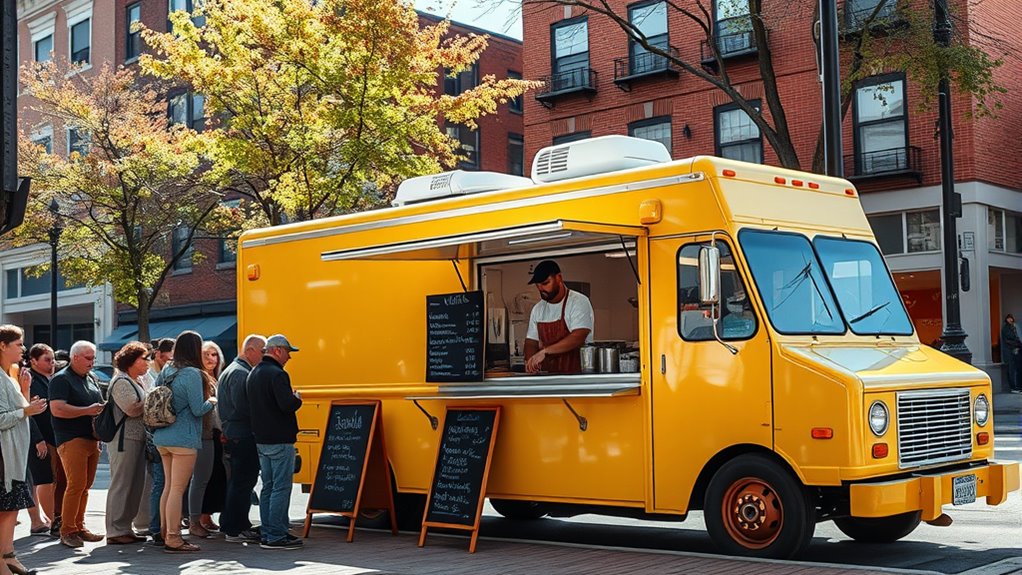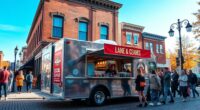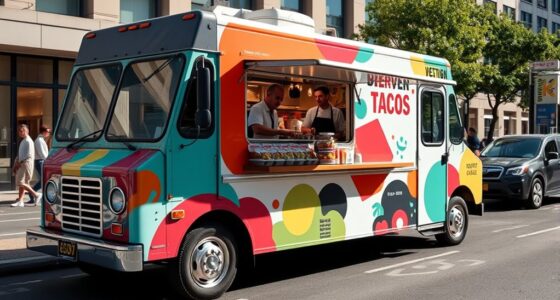To open a food truck in Springfield, Massachusetts, you’ll need to obtain a Mobile Food Establishment Permit, which costs $125 to $250 annually. Make sure to follow zoning laws, operate in approved locations, and comply with health and safety standards. Develop a strong menu and branding, plus plan your equipment setup carefully. Maintaining permits and engaging with the community are key. Continue exploring to learn more about turning your food truck idea into reality.
Key Takeaways
- Obtain a Mobile Food Establishment Permit from Springfield or MA DPH, costing $125-$250 annually, with required health and safety certifications.
- Operate within designated zoning districts and approved zones, avoiding restrictions near schools and residential areas.
- Develop a strong brand with consistent visuals, leverage social media, and participate in community events for visibility and customer loyalty.
- Finalize and submit menu for health approval, design an efficient, compliant truck layout, and ensure staff certification in food safety.
- Install NFPA-compliant safety systems, select versatile equipment, and optimize space for safe, efficient food preparation and service.
Navigating Permit Requirements and Costs in Springfield
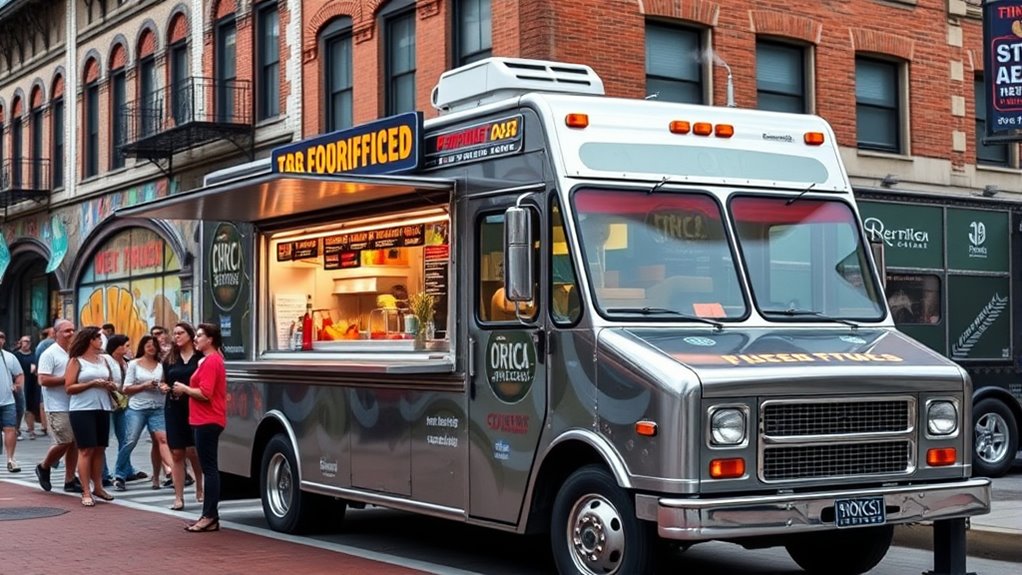
Understanding permit requirements and costs in Springfield is a straightforward process if you understand the steps involved. First, you need to apply for a Mobile Food Establishment Permit through the Springfield Health Department or Massachusetts DPH. Your application must include completed forms, proof of food safety certification, and passing a health inspection. The permit verifies compliance with food storage, sanitation, and equipment standards and is valid for one year, requiring renewal. Fees typically range from $125 to $250, depending on your vehicle and menu type. You’ll also need a business license from Springfield, which is renewed annually. Remember, all permits and licenses must be displayed on your truck during operation. Additional costs may include fire permits or other safety certifications. In addition, obtaining liability insurance is highly recommended to protect your business and comply with local regulations. Also, understanding food safety standards is essential to maintain compliance and ensure customer safety.
Understanding Zoning Laws and Ideal Operating Locations
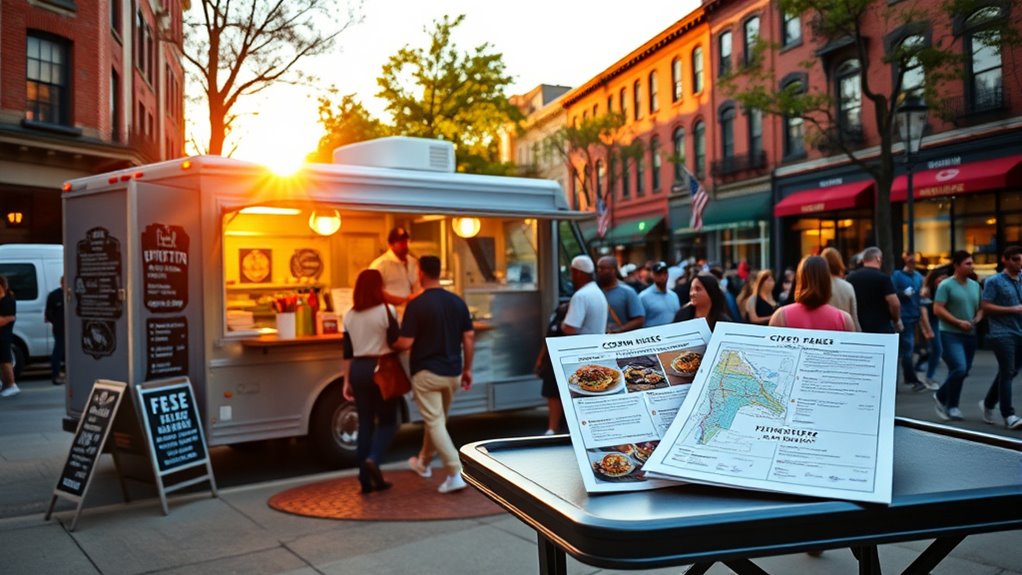
Understanding Springfield’s zoning laws is essential for food truck operators to choose the right locations and stay compliant. You must operate within specific zoning districts and adhere to use regulations outlined in the Springfield Zoning Ordinance. Most operating sites are limited to designated food truck zones or areas requiring special approval. You should avoid restrictions near schools, residential neighborhoods, and sensitive or high-traffic areas to prevent nuisances. The zoning rules include site plan reviews, special use permits, and compliance with dimensional and intensity regulations. Springfield designates certain public lots and business districts for food trucks, but operating outside these zones requires city approval. Always verify current approved zones with the Springfield Planning Department, especially if planning to operate near event venues, parks, or commercial corridors.
Planning Your Menu and Ensuring Food Safety Compliance
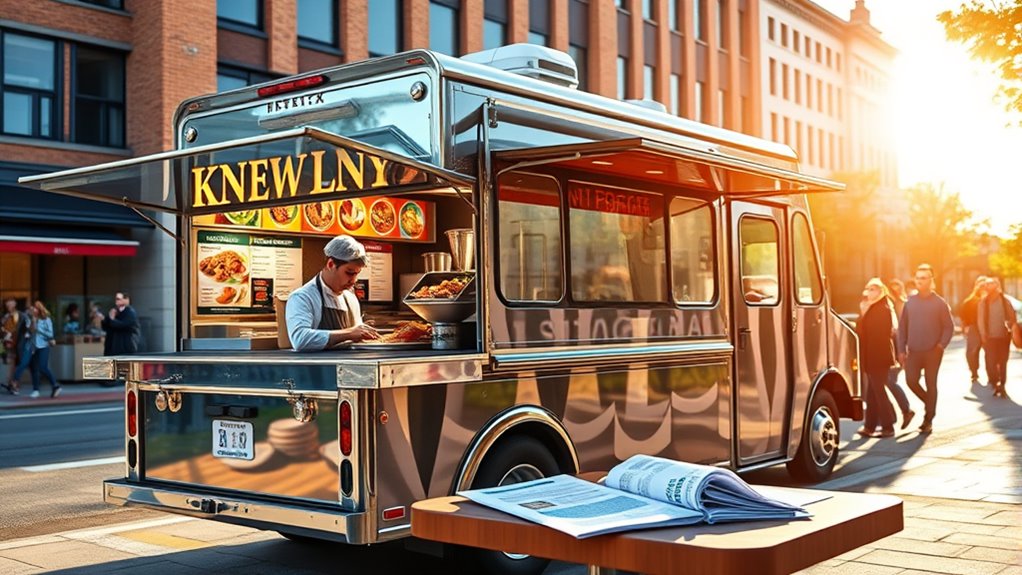
Planning your menu carefully is essential for food truck success in Springfield, as it directly affects your kitchen layout, equipment needs, and food safety compliance. Your menu must be finalized and submitted to the local Board of Health as part of your permit application. It influences the truck’s design, storage, and preparation areas, so a sample menu is required for inspections. Proposed items need approval to ensure they meet safety standards, especially for pre-cooked and pre-cooled TCS foods. You should consider the truck’s refrigeration and prep space limitations. Additionally, at least one team member must hold a Certified Food Protection Manager certificate, with all staff trained in safe handling. Proper documentation, compliance with health inspections, and adherence to Massachusetts food safety laws are critical for a smooth operation. Incorporating proper food handling practices is vital to maintaining safety and compliance throughout your operation.
Maintaining Operational Standards and Handling Renewals
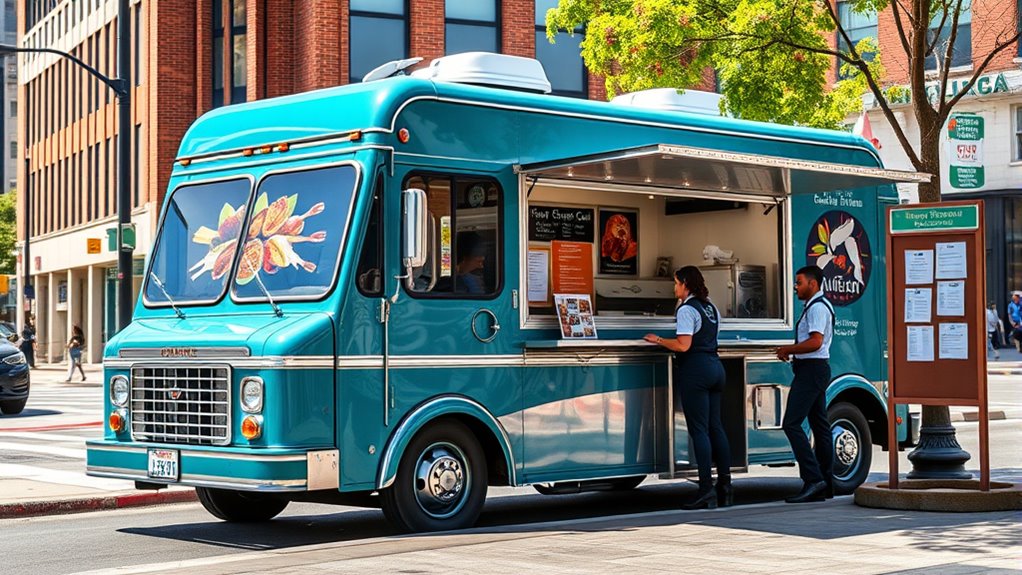
Maintaining operational standards and managing renewals are essential for keeping your food truck compliant and open in Springfield. You must pass annual health inspections focused on food safety, sanitation, and equipment. After each inspection, you’ll need to renew your health permit, providing updated documents like inspection results and certification proofs. Additionally, your business license requires yearly renewal, including fees and compliance evidence. Regular maintenance of equipment and adherence to health and safety regulations are vital to ensure ongoing compliance and avoid penalties. Staying current prevents fines, permit suspension, or closure.
Strategies for Effective Marketing and Building a Customer Base
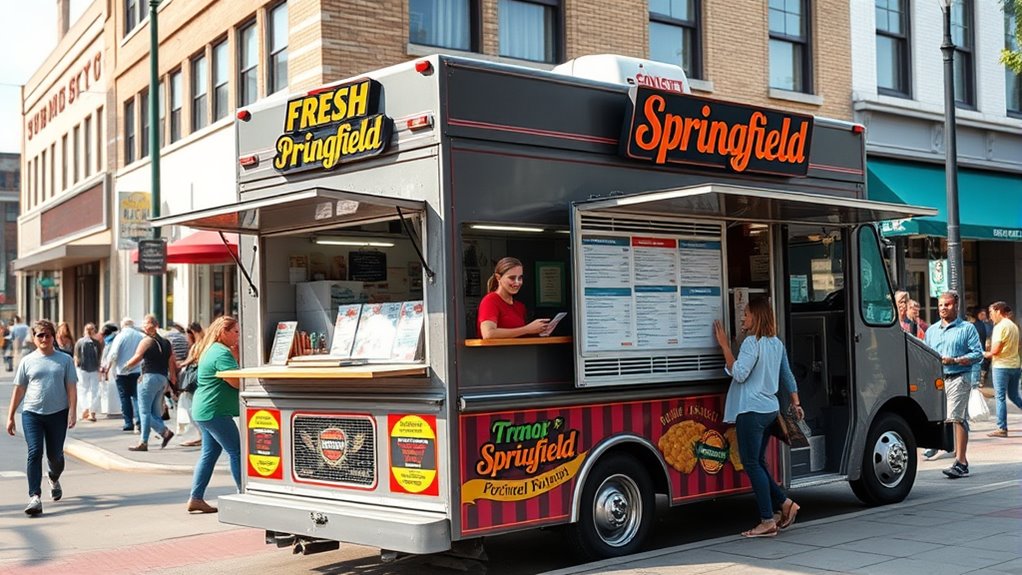
To build a loyal customer base, start by leveraging social media platforms like Facebook and Instagram to promote your truck and share updates. Participating in local events and festivals can also boost visibility and attract new customers. Additionally, developing a strong, unique branding strategy helps your truck stand out and creates a memorable experience for your audience. Over 50% have implemented loyalty programs, resulting in a 30% increase in repeat visits, so incorporating such initiatives can further strengthen customer retention. Embracing stillness in your planning process can also enhance your focus and help you make clearer, more effective decisions.
Leverage Social Media Platforms
Wondering how to maximize your food truck’s visibility? Leveraging social media is key. Use Instagram for eye-catching photos and reels of your menu to attract food lovers. Facebook is great for promotions, contests, and engaging your local community through posts and groups. Twitter helps with real-time updates like location changes or sold-out items, connecting quickly with younger audiences. TikTok allows you to create fun, creative videos showcasing cooking or customer moments that can go viral. YouTube supports longer content like behind-the-scenes videos or cooking demos to build a deeper connection. Additionally, understanding the Technical Aspects of Emailing can help you maintain ongoing communication with your customers through newsletters and targeted campaigns. Here’s a quick overview:
| Platform | Content Focus | Best Use |
|---|---|---|
| Photos & Reels | Attract foodies, showcase menu | |
| Promotions & Community Engagement | Announce events, run contests | |
| Real-time updates | Location changes, quick customer service | |
| TikTok | Short, creative videos | Viral marketing, entertainment |
Social media marketing is a powerful tool for building your customer base and increasing brand awareness in Springfield, Massachusetts.
Engage in Community Events
Participating in community events offers a powerful way to boost your food truck’s visibility and attract loyal customers. By engaging in local festivals, neighborhood gatherings, and civic celebrations, you can showcase your menu and build strong community ties. These events draw diverse crowds, giving you direct interaction and immediate feedback. To maximize your impact, consider:
- Joining regional food truck festivals like the Southern NH Food Truck Festival
- Providing food at neighborhood parties, school events, and street fairs
- Collaborating with community organizations for catering opportunities
- Supporting local causes to strengthen your public image
- Attending recurring community events like Food Truck Fridays at West Springfield’s town common, which regularly attracts residents and visitors alike Community gatherings such as Food Truck Fridays on August 8, 15, 22, and 29, provide ongoing opportunities for exposure. Establishing a presence at these recurring community events can help build familiarity and trust with local residents, turning casual passersby into loyal customers.
These strategies help you connect with your audience, generate positive word-of-mouth, and establish a trusted presence in Springfield’s vibrant community. Consistent involvement guarantees ongoing visibility and customer loyalty.
Develop Unique Branding Strategies
Creating a strong and memorable brand is essential for standing out in Springfield’s competitive food truck scene. You need a distinct visual identity—design a logo and color scheme that reflect your truck’s personality. Consistent fonts, graphics, and packaging build recognition across all touchpoints. Eye-catching truck wraps or decals help you stand out in crowded areas and events. Align your branding with your target audience, especially Millennials and Gen Z, who prefer trendy, Instagrammable aesthetics. Refresh your branding regularly to stay modern without losing your core identity. Leverage social media strategically by maintaining active profiles on platforms like Facebook, Instagram, and TikTok. Share engaging content, run targeted ads, and use geotagging to attract local customers. Strong branding creates a lasting impression and builds a loyal customer base. According to recent marketing research, a cohesive brand identity can significantly increase customer loyalty and recognition over time, especially when you incorporate visual branding strategies that resonate with your audience.
Tips for Choosing the Right Equipment and Setup
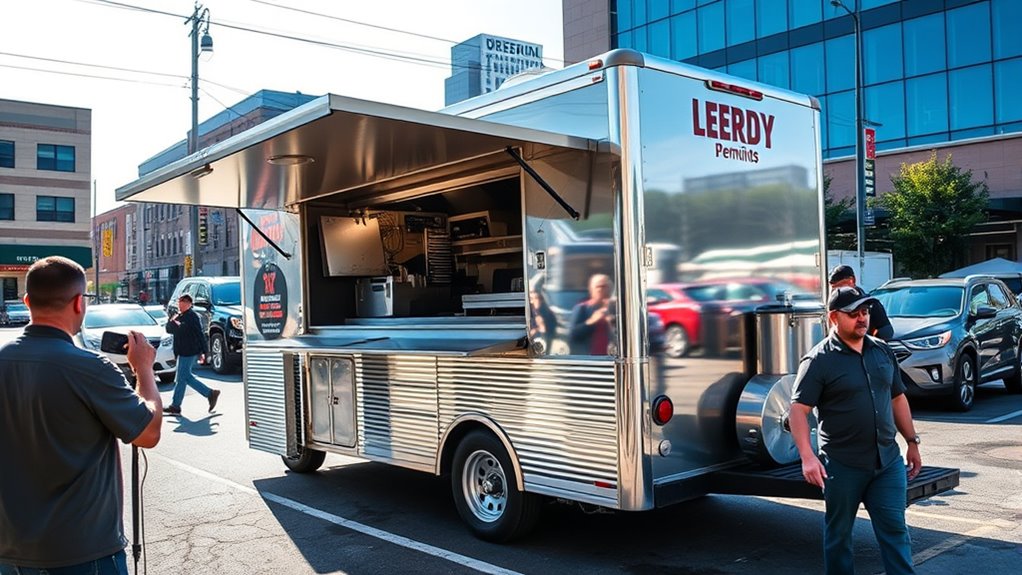
Choosing the right equipment and setup is vital for your food truck’s success and safety. You need to select appliances that meet certification standards and fit your menu, while also planning your space efficiently. Ensuring safety and compliance from the start helps you operate smoothly and avoid costly issues later. Using proper cleaning and maintenance techniques for your equipment will extend its lifespan and ensure consistent performance.
Essential Cooking Appliances Selection
Selecting the right cooking appliances for your food truck begins with understanding your menu and available space. Focus on equipment that matches your core offerings while fitting within tight truck dimensions. Prioritize durable, high-quality appliances that can handle high-volume service and meet safety standards, including ventilation and fire suppression. Compact designs are essential to maximize limited space. Energy efficiency reduces operational costs and helps manage power constraints. Work tables and storage solutions are equally important to keep your workflow organized and efficient, ensuring quick service and easy cleaning. Consider these points: – Choose versatile appliances like griddles and fryers to cover multiple menu items. – Opt for space-saving, easy-to-clean models to streamline operations. – Ensure appliances meet health, safety, and ventilation requirements. – Think about multifunctional equipment to adapt to menu changes and save costs. Additionally, incorporating self-watering plant pots into your truck’s design can help maintain greenery and create an inviting atmosphere without adding significant maintenance tasks.
Space Optimization Strategies
Maximizing space in your food truck requires careful planning of your layout and equipment placement. Design your workspace to minimize staff movement between prep, cooking, holding, serving, and cleaning zones, with clear pathways to prevent congestion during busy times. Position storage near prep areas for quick ingredient access and install shelving or hanging racks on walls to free countertop space. Use wall-mounted equipment and under-counter refrigerators for efficient storage. Incorporate multipurpose surfaces, collapsible counters, and stackable appliances to increase flexibility. Cluster appliances based on menu needs, opting for energy-efficient, compact, and portable options to save space. Innovative storage solutions such as modular shelving and stackable containers can further optimize your setup. Finally, streamline water and waste management with integrated fixtures and designated cleaning stations.
Safety and Compliance Equipment
Effective safety and compliance setup begins with understanding the equipment and systems required to keep your food truck operating safely. You must install proper fire suppression and exhaust systems, especially if cooking with grease or smoke. Regularly inspect and clean exhaust hoods to meet NFPA 96 standards, and ensure fire suppression systems protect all combustible appliances. All fuel and cooking equipment should be free of hazards before use, with approvals from the local fire department.
Remember to maintain:
- At least 10 feet clearance from structures and vehicles
- Unobstructed access for fire crews
- Proper sanitation of food contact surfaces
- Adequate handwashing facilities
Prioritize these elements to meet safety codes, reduce fire risks, and ensure smooth operation.
Frequently Asked Questions
Are There Specific Permits Required for Seasonal Food Truck Operations in Springfield?
You’ll need a Mobile Food Establishment Permit, issued by Springfield’s health department, valid for one year, with annual renewal. Also, obtain a health permit after passing an inspection, and a business license from the city. For seasonal operations, specify your dates on permits, and verify compliance with zoning rules. Remember to display all permits visibly on your truck and follow sanitation and location regulations to stay compliant.
Can I Operate a Food Truck Without a Fixed Commissary Kitchen in Springfield?
You might wonder if you can run your food truck without a fixed commissary kitchen in Springfield. Well, trying to do so is like building a house without a foundation—dangerous and unlikely to pass inspections! Springfield requires a compliant commissary or approved servicing area for food safety, storage, and prep. Unless you can prove an equivalent setup, operating without one risks permit denial and serious health violations, so it’s best to have a proper commissary.
What Are the Penalties for Operating Without Proper Permits in Springfield?
You risk serious penalties if you operate without proper permits in Springfield. The health department can impose fines, orders to cease operations, or even revoke your permits permanently. Operating without a valid business license or failing health inspections can lead to immediate shutdowns, costly fines, and legal actions. To avoid these consequences, make certain you obtain all necessary permits, pass inspections, and display licenses visibly on your food truck.
How Do Weather Conditions Affect Food Truck Licensing and Operation in Springfield?
They say “weather is what you make of it,” but in Springfield, it directly impacts your food truck licensing and operations. Rain, snow, or extreme heat require you to adapt quickly—weatherproofing equipment, adjusting service hours, or relocating to safer zones. Inspections might be scheduled around seasonal weather, and extreme conditions could force temporary closures. Staying flexible and prepared guarantees you stay compliant and keep your business rolling smoothly despite the weather’s whims.
Are There Restrictions on Alcohol Sales From Food Trucks in Springfield?
You should know that Springfield has strict restrictions on alcohol sales from food trucks. You need a valid license from the Springfield License Commission, and only certain entities or individuals over 21 can qualify. You can’t sell alcohol outside of licensed premises, especially in open containers on streets. Also, sales are limited to specific hours, and you must follow all local zoning, health, and enforcement rules to stay compliant.
Conclusion
Starting your food truck in Springfield is like tending a garden—you must nurture permits, select prime locations, and cultivate a compelling menu with care. With patience and strategic planning, your venture will bloom amidst the city’s bustling streets. Remember, consistency and community engagement are your sunlight and water. Keep tending your dream with dedication, and watch your food truck flourish into a beloved local landmark.
